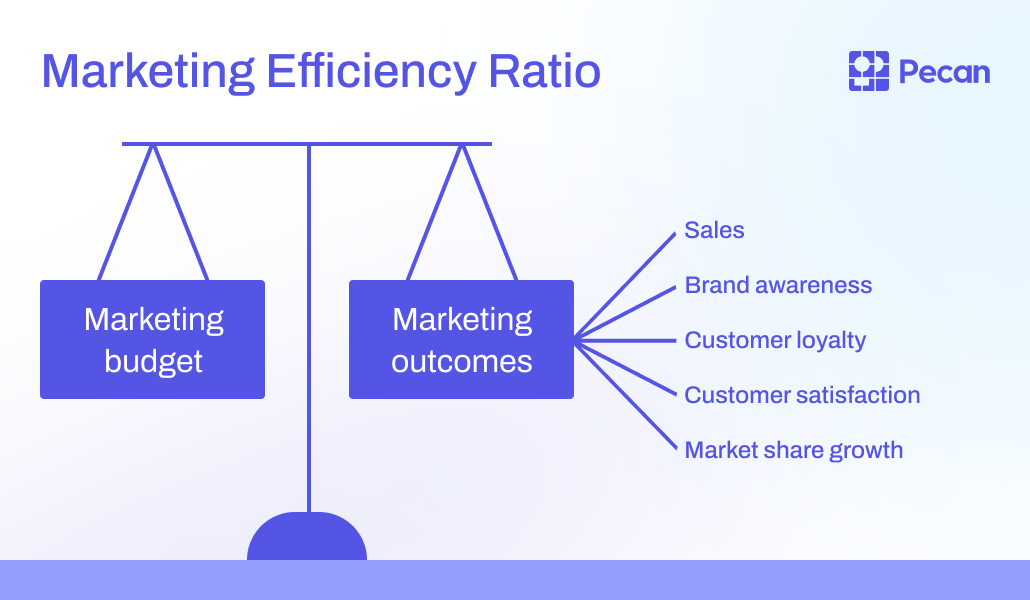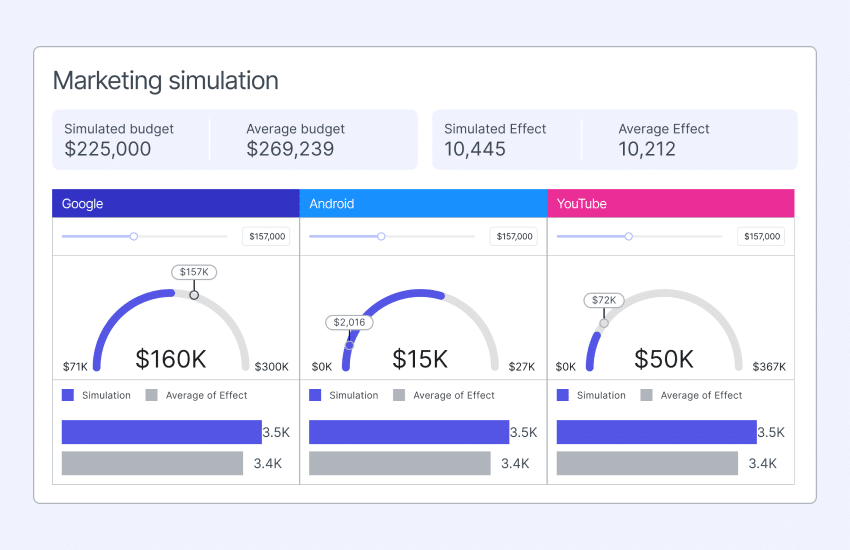In a nutshell:
- MER stands for marketing efficiency ratio and measures the effectiveness of marketing efforts.
- It calculates the balance between marketing budget and outcomes achieved.
- MER is important for strategic planning and can improve marketing efficiency and ROI.
- AI can enhance MER by analyzing data and providing actionable predictions that improve marketing campaigns and guide strategic decisions.
- Challenges in maximizing MER can be overcome through accurate measurement, effective data utilization, and continuous learning.
It's crucial for marketing managers and leaders to stay ahead of the game and continuously optimize their strategies. One key factor in achieving marketing efficiency is understanding and effectively utilizing a marketing efficiency ratio (MER). But what exactly does MER stand for in marketing?
Marketing efficiency ratio (MER) measures how well your marketing strategy or campaign performs holistically. It calculates the profitability of marketing efforts by determining how much money is spent to achieve results.
In this blog, we'll delve into the definition and breakdown of MER, exploring its importance in strategic planning and its impact on marketing efficiency and return on investment (ROI). We'll also discuss how MER is calculated and its application in different marketing strategies, both traditional and digital.
We'll explore how artificial intelligence (AI) can improve MER. Finally, we'll address the common challenges in maximizing MER and provide solutions to overcome them.
What Does MER Stand For in Marketing?
MER in marketing stands for marketing efficiency ratio. This is a measure used to determine the efficiency and effectiveness of a company's marketing efforts. It can be broken down into two components: the amount spent on marketing (the budget) and the results achieved from these efforts (the outcomes).
Understanding MER involves understanding the balance between resources spent and the results obtained, or more specifically, how much a company invests in marketing and how much it gets back in terms of increased sales or other desired outcomes.
While most marketing actions have an endpoint goal of profits, MER may also measure indirect profit generators, such as brand awareness, customer loyalty, customer satisfaction, and market share growth.
For example, a marketing campaign may not directly lead to an immediate increase in sales, but it may improve brand recognition, which can lead to increased sales over time. Similarly, efforts to improve customer service may boost customer satisfaction and loyalty, leading to repeat purchases and referrals.
Additionally, capturing a larger market share is often an indirect result of effective marketing, as it can position the company as a leader in its industry. All these factors indirectly contribute to profit generation and should be considered when calculating and interpreting MER.
The Importance of MER in Marketing
The role of MER in strategic marketing planning can't be overstated. It objectively measures the effectiveness of a company's marketing activities (more specifically than a general business-wide efficiency ratio). This data-driven approach can inform decision-making and help with budget allocation, ensuring that resources are being used as efficiently as possible.
Moreover, MER has a direct impact on a company's marketing efficiency. By analyzing MER, marketers can identify areas of inefficiency, adjust their strategies, and ultimately boost their ROI.
The relationship between MER and ROI is mutually reinforcing. Higher MER often leads to higher ROI, as it indicates that the marketing activities are efficient and effective. Conversely, a low MER can signal that a re-evaluation of the marketing strategies may be necessary.
"The marketing efficiency ratio (MER) is an essential metric that I believe every marketer should be using to measure the success of their marketing campaigns. It gives a more holistic view of the efficiency of your marketing decisions, which allows you to make informed decisions that drive growth across the entire business."
— Jared Shaner, CRO & partner, e-commerce agency Trellis, in Forbes
How is MER Calculated?
The calculation of MER is relatively simple. It's essentially the marketing outcomes divided by the marketing budget. However, both the marketing outcomes and the budget must be accurately measured and reported to ensure that MER calculated is representative of the marketing efficiency.
MER must be calculated regularly to monitor the success of current marketing strategies and adjust them as necessary. By regularly calculating MER, marketers can keep a pulse on the effectiveness of their strategies and make data-driven decisions to improve their campaigns. This also allows for quick course correction if a particular strategy isn't yielding the expected results, thereby ensuring resources aren't wasted and the highest possible return on investment is achieved.
It's important to note that the marketing outcomes considered while calculating MER can vary based on the company's specific goals and KPIs. For example, for companies focusing on improving their online presence, the outcomes could be things such as website traffic, social media engagement, or email newsletter sign-ups.
On the other hand, foot traffic might be considered an important outcome for companies with brick-and-mortar stores. Therefore, while calculating MER, it's essential to clearly understand what constitutes a “successful outcome” for your business and marketing strategy.
Application of MER in Different Marketing Strategies
MER can and should be used in both traditional and digital marketing strategies. In traditional marketing tactics, such as TV or radio advertising, MER can help measure the success of these strategies and inform future planning.
Similarly, MER can be an invaluable tool in the digital marketing landscape. It can, for example, inform decisions about advertising expenditures on social media, search engine optimization, and content marketing.
Digital marketing tools are especially valuable in calculating MER because of the availability of analytics and metrics, such as click-through rates, bounce rates, conversion rates, and customer engagement metrics. These metrics can offer real insights into the effectiveness of different strategies, giving a more nuanced understanding of MER.
For instance, if a social media campaign has a high click-through rate but a low conversion rate, this could indicate that while the campaign is good at generating interest, it's not as successful at turning that interest into sales. This kind of detailed analysis can be crucial in fine-tuning your marketing strategies to optimize your MER.
Tailoring your marketing approach based on MER is a smart business practice. It ensures that resources are efficiently used and that marketing activities yield the desired results.
How Can AI Improve MER?
AI intersects with marketing efficiency in numerous ways. AI can analyze vast amounts of data quickly and accurately, resulting in more precise MER calculations.
Furthermore, AI can help optimize marketing efforts. AI tools can analyze customer behavior, predict trends, and provide insights to inform marketing strategy. Because AI never sleeps, it can consistently monitor and analyze data in real time, offering immediate adjustments to marketing strategies as market conditions change. This allows for a more proactive rather than reactive approach, potentially leading to higher efficiency and effectiveness of marketing campaigns.
AI solutions like Pecan are designed to increase marketing efficiency. AI achieves this goal by analyzing large amounts of data, using machine learning algorithms to predict optimal marketing strategies, and providing actionable insights.
Here are some of the key AI use cases in marketing that can improve marketing efficiency:
- Lifetime Value (LTV) Prediction for Segmentation:Predictive analytics can look into the future to estimate individual customers' lifetime value, enabling segmentation based on their value to the business.
- Marketers can allocate resources and tailor marketing strategies more effectively to high CLV segments.
- Better Targeting Customer Winback Campaigns:Predictive models can identify customers at risk of churning and assess the probability of their return.
- This allows for creating personalized winback campaigns that target the right audience with relevant offers, improving success rates.
- Optimizing Budget Allocation with Marketing Mix Modeling:Marketing mix modeling can use AI and simulations to help assess the impact of different marketing channels on sales.
- Marketers can allocate their marketing spend more efficiently by focusing on channels and campaigns that provide the highest return on investment (ROI).
- Enhancing Personalization:Predictive AI models can predict customer behavior and preferences, allowing for highly personalized marketing messages and product recommendations, such as for upsell and cross-sell offers.
- Churn Prediction and Prevention:AI-driven predictive analytics can identify customers likely to churn, enabling proactive retention strategies to keep valuable customers.
By leveraging predictive analytics in these ways, marketing teams can make more data-driven decisions, improve targeting, allocate resources more efficiently, and ultimately enhance their marketing efficiency and effectiveness.
These insights can be used to fine-tune your marketing tactics, better understand your audience's behavior and preferences, predict future market trends, and ultimately make more informed decisions about when, where, and how to execute your marketing campaigns.
These insights can also help you identify growth opportunities and areas for improvement, enabling you to continually refine and enhance your marketing strategies.
Case Study: Improving MER with Marketing Mix Modeling
With a marketing budget exceeding $1 billion, one Pecan customer faced the task of allocating its resources effectively across various channels. Approximately 30% of the budget was dedicated to linear TV and radio advertising, which posed data collection challenges. Additionally, limited digital marketing data and inadequate attribution methods further complicated decision-making.
The company's economic performance prompted a need to enhance marketing efficiency without sacrificing revenue. Enter Pecan's marketing mix modeling (MMM), which offered a solution to predict customer inquiries based on budget allocation.
The MMM model enabled accurate national and state-level predictions by analyzing four years of marketing spending data, channel distribution, and inquiry numbers, informing both short- and long-term budget planning and strategy. Pecan's platform also allowed marketers to simulate the impact of different budget allocations, optimizing spend by channel, month, and state within defined constraints.
With MMM, the marketing team gained insights into the effects of various channels and allocation adjustments, ultimately increasing customer inquiries while saving over $100 million annually.
In challenging market conditions, MMM empowers marketers to make data-driven decisions, maximizing the impact of every dollar in their budgets and fostering long-term business success.
Challenges in Maximizing MER and How To Overcome Them
Despite its many benefits, maximizing MER can present several challenges. These may include accurately measuring marketing outcomes, effectively utilizing data, and maintaining up-to-date marketing knowledge.
However, these challenges can be overcome. Accurate measurement of marketing outcomes can be achieved through systematic data collection and analysis even in the traditional marketing setting. Effective utilization of data can be fostered through ongoing analysis and insights. Lastly, maintaining up-to-date marketing knowledge can be accomplished through continuous learning and industry engagement.
Applying MER in marketing is a vital skill for any marketing manager or leader. It provides a clear, objective measure of marketing efficiency and can inform strategic planning and decision-making. Pecan's AI solution can help optimize your marketing strategies and boost your MER, ultimately leading to higher ROI on traditional and digital marketing strategies.
We invite you to learn more about Pecan and how we can help you streamline your marketing strategies to improve your MER. With the right approach and tools, you can maximize your marketing efficiency ratio and significantly increase your ROI for every dollar spent. So, why wait? Start optimizing and see the results for yourself!






